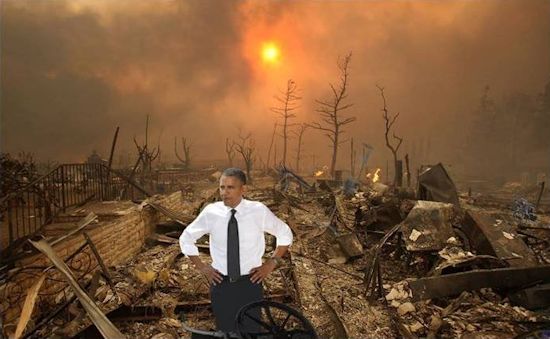![]()
RubinReports | By Barry Rubin
The United States now estimates it will take one year for Iran to get nuclear weapons; Israel says some months.
Is Iran a Lunatic State or a Rational Actor? It is neither; it is a Rational Aggressor.
“One of the great unresolved questions of Barack Obama’s presidency,” says Time Magazine, “is whether he can peacefully resolve America’s conflict with Iran over its nuclear weapons’ program.”
Ridiculously wrong.
One of the great unresolved questions of Barack Obama’s presidency is whether he can successfully resolve America’s conflict with Iran over its nuclear weapons’ program.
Time continues that the Obama-Rouhani handshake “would be the most important…handshake since the historic grip between Rabin and Arafat….”
Also wrong. Remember that while it has still not been admitted by the United States, that event 20! years later was a failure costly in lives. Israel must satisfy seemingly monthly American demands by releasing terrorists who murdered Israelis.
The handshakes of Prime Minister Neville Chamberlain with Hitler (the Munich agreement) and of the Nazi foreign minister and Stalin (the Nazi-Soviet pact) were also a historic grip, at the time peaceful but not ultimately successful.
Time continues,
“It would only be a symbolic act, to be sure. But when it comes to international diplomacy, symbolism can go a long way.”
But it is not a mere symbolic act but the start of a foolish deal that Iran will break.
So is Iran a lunatic state or a rational actor? A hell of a lot more rational than U.S. foreign policy is today, as apparently has been the Muslim Brotherhood’s policy and trickery. After all, the UN just elected Iran as Rapporteur for the General Assembly’s main committee on Disarmament & International Security without Tehran having to do anything. And Obama will blame Congress for diplomatic failure if it increases sanctions. In fact, diplomats doubt Iran will actually do anything anyway.
That’s not moderate but radical in a smart way.
More politely, Iran is a rational actor in terms of its own objectives. The issue is to understand what Iran wants. Policy is always best served by truth, and the truth is best told whether or not people like it. Iran is an aggressive, rational actor.
Remember: The problem is not that Iran is eager to use nuclear weapons but that the Obama Administration is not going to apply containment properly and credibly. And that encourages Iran’s non-nuclear aggression and terrorism.
The hysteria over Iran, however, had also better get under control, even as the real, very threatening situation should be understood. Armchair theorists from far away may want to provoke a U.S.-Iran war. This is a bad idea.
The fact is that the history of the Iranian Islamic regime does not show suicidal recklessness. A key reason for this is that the leaders of Iran know they can be reckless without risking suicide. In other words, Iran did face threats from the West commensurate with what Tehran was doing. Therefore, the risks it took were not suicidal. If apparently suicidal rhetoric does not produce suicide but serves a very specific purpose, that rhetoric is not in fact suicidal.
What, then, did Iran want?
Its basic goal was to be as powerful a regional hegemon as possible — including control over Syria and Lebanon. It would like to take leadership of all Muslims in the area. Today, however, it is clear that the Sunni Arabs reject Tehran’s leadership and will fight against it.
In other words, the ultimate extent of Iran’s zone of influence could only include part of Lebanon, Syria, Iraq, southwest Afghanistan, Bahrain, and the eastern province of Saudi Arabia. That is the maximum, and Iran is far from achieving that goal. And it will probably never achieve it.
Iran’s influence is limited by the location of Shia Muslims. Not all Shia Muslims favor Iran, and pretty much all Sunni Muslims oppose it. Therefore, whatever the outcome is in Syria — in other words if the regime wins — Iran will at most keep its current levels of influence. But if the regime wins, the Sunnis will hate Iran even more and will fight against it harder.
So Iran still wants to get the most power without fearing reprisal.
Nuclear weapons are a defensive shield to carry out conventional aggression.
As I’ve insisted for many years, it is increasingly clear that Iran will get nuclear weapons. We should start discussions in that framework. The recent brilliant decision of the Iranian elite — who is not only more ruthless but strategically smarter than Western leadership — to pick a national security insider, who is at best a slightly moderate extremist, as president guarantees it.
The question is only: when will Iran get nuclear weapons? The evidence seems to show that this is several years away. (It would be interesting if that development was too late to affect Syria’s civil war, and such will probably happen.)
Why will Iran certainly get nukes?
First, the West isn’t going to take strong enough action to stop it because the alternatives are deemed — perhaps accurately so — too risky. No surgical Israeli strike is going to stop it, and Obama will never support such a strike. Of course, there is a great deal of indifference about the potential victims and lots of greed about the money to be made from Iran. The sanctions may seem tough, but there are more holes than cheese. U.S. companies sensing profits as sanctions hopefully fall are chomping at the bit.
After Ahmadinejad, though, there is perhaps a better money-making climate. His successor will further soothe Western willingness to battle on this nuclear issue.
And of course they just don’t care that much about potential genocide in Israel.
Second, with international support at a low point, the logistical difficulties, and a U.S. president who is incredibly reluctant, Israel is not going to attack Iran to stop it from getting nuclear weapons. What Israel should and will do is to make clear it will attack Iran if there is any reason to believe that Tehran might launch nuclear weapons. It will build up a multilayer defensive and offensive system.
This is not mere passive containment but would mean assured massive retaliation.
Note that there is more than one potential victim of Iran’s nuclear weapons. People, including the Israelis, talk a lot about Israel. Yet the Sunni Arab states are increasingly involved in shooting situations with Iranian proxies. Unlike Israel, they won’t do anything and perhaps can’t, except to beg the United States to take strong action. But the U.S. won’t do so.
And of course everyone can just hope everything will turn out all right.
A rare piece of good news, however, is that before the “Arab Spring,” it was conceivable that Iran might become leader or hegemon of the Arabic-speaking world. Israel-bashing was an important tool to do so. Now the Sunni Muslims have their own successful — even U.S.-backed! — Muslim Brotherhood movement. They not only don’t need Iran any more, they fight against Tehran.
Pushed on the defensive with more limited prospects — and knowing the Israel card won’t work — Tehran has lots less incentive to stake its survival on that issue. The nuclear weapons arsenal isn’t intended for a big bang to get revenge on Israel, it’s intended to keep the current regime in power against a growing number of enemies.
Put bluntly, Iran won’t waste its nuclear weapons on Israel or, as they might put it in Tehran, to give Israel an “excuse” to attack Iran. No pile of quotes from Iranian leaders to the contrary changes anything.
The key factor is not an appeal to the “international community” to protect Israel. Israel’s power rests precisely in old-fashioned credibility and deterrence:
Only Israel can credibly destroy the Islamic regime. And the Islamic regime in Iran knows that.
Israel was so important in Iranian verbal declarations precisely because Israel could at one time be turned into a card that strengthened Iran’s appeal with the Arabs and the Sunni. Iran certainly had very few other cards. But the Sunni and Arabs don’t care about this, given the big change of the last two years. The Israel card — as shown by the Syrian regime’s failure with it — is worthless.
Note that while Iran has been the leading sponsor of international terrorism and poured invective out against Israel, Iran did not notably take any material action against Israel beyond terror attacks and its sponsorship of Hizballah, Hamas, and Syria — which were its allies at the time. Compared to Arab efforts in the second half of the twentieth century, this was not very much.
In other words, against Israel, the Tehran regime talked a big game but did relatively little.
On other issues, too, Iran did not act like a country bent on suicide. Against its Arab enemies, it did not take considerable risks. Iran could wage a proxy war against America in Iraq, because the United States didn’t do very much about it.
All of the above in no way discounts an Iranian threat. Yes, of course, Iran sponsored terrorism and sought to gain influence and to spread revolution. Yet it did not attack a single country in open terms of warfare. Remember, Iran was invaded by Iraq. And when Ayatollah Ruhollah Khomeini himself was persuaded that the United States was entering the war against him, he quickly ended it, though he said that doing so was like eating snakes and scorpions; but that was necessary to preserve the regime.
Iran is the kind of aggressor who was once described by Winston Churchill as a thief who went down the street rattling doors to find one that was open.
Second, Iran sought to defend itself by threatening antagonists with total destruction and by obtaining the ultimate deterrence, nuclear weapons. This does not mean one should sympathize with Tehran since, after all, it sought nuclear weapons to ensure its defense while it continued aggressive policies.
Iran can also complain about American encirclement. Of course, if it did not follow the policies that were being practiced, there wouldn’t be a U.S. motive for any such efforts. The point, however, is that the claim that Iran is seeking nuclear weapons so it could destroy itself by attacking Israel is just not demonstrated.
Thus, Iran is not a demonic, crazed, kamikaze country. It is simply a typical aggressor who wants to have insurance against having to pay the price of such continued activity. North Korea and Pakistan sought nuclear weapons for the same reason, and it is working for them.
Let’s approach the issue in another way. Suppose Iran helped the Syrian regime win the civil war. Would the danger to Israel be increased? No, certainly it would not be from a nuclear standpoint. Assad would reestablish control over a wrecked and tottering country where the damage would take years to rebuild. But the problem is that Iran will be more secure in defending itself which means it will be more aggressive, but now with nuclear weapons.
The use of nuclear weapons loses whatever the possession of nuclear weapons gains.
Iran would be relieved at the Syrian regime’s survival but would not be better able to carry on a (nuclear) war against Israel. The Sunnis would be prepared to cooperate with the United States against Iran and even, covertly, with Israel up to a point. Indeed, the ability of Sunni Islamists to attack Israel would be reduced because of their obsession with the principal danger.
Again, I don’t want Assad to win in Syria. I believe that Iran is a threat. I think Iran will succeed in getting nuclear weapons. I don’t think the Tehran regime consists of lunatics who cannot wait to immolate themselves in a fiery funeral pyre. They want to stay in power for a long time. Israel has an alternative of preemption if necessary. But the United States will never help stop Iran’s getting of nukes.
This analysis should be conducted in a sober fashion. I believe, indeed I see clearly, that Israeli policymakers understand these issues. We should remember that Iran is not an insane state and that there are threats other than Iran in the Middle East.
The problem is not that Iran is eager to use nuclear weapons but that the Obama Administration is unlikely to apply containment properly and credibly. And then its version of containment might fail.
Barry Rubin is director of the Global Research in International Affairs (GLORIA) Center and editor of the Middle East Review of International Affairs (MERIA) Journal. His next book, “Nazis, Islamists and the Making of the Modern Middle East,” written with Wolfgang G. Schwanitz, will be published by Yale University Press in January 2014. His latest book is “Israel: An Introduction,” also published by Yale. Thirteen of his books can be read and downloaded for free at the website of the GLORIA Center including “The Arab States and the Palestine Conflict,” “The Long War for Freedom: The Arab Struggle for Democracy in the Middle East” and “The Truth About Syria.” His blog is Rubin Reports. His original articles are published at PJMedia.



 RSS
RSS











Latest Comments
... [Trackback] [...] Read More: crethiplethi.com/contact-form/trackback/ [...]...
Hello Mike, Thank you for your positive feedback to the article. I felt there wasn’t too much critical analysis of ...
Thanks for this considered and well constructed article. A follow up article on the manner in which the editorial contro...
THE CLUELESSNESS OF CLAIMING THAT OBAMA'S MIDDLE EAST POLICIES WERE A FAILURE CANNOT BE FURTHER FROM THE TRUTH, WHAT THE...
As long as Obama is the president of the usa do not trust the us government......